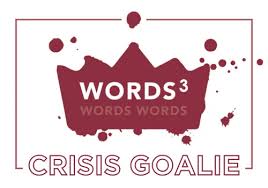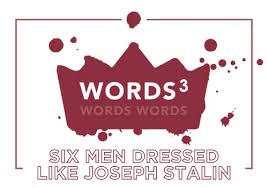CEDAR CITY — The new play development series at the Utah Shakespeare Festival has existed for many years, and I have been lucky enough to participate in it many times over the last few decades. Each summer the Words Cubed (as in Hamlet’s exclamatory “Words, words, words!”) selection committee chooses two scripts from hundreds of submissions. The selected playwright’s are then invited to Cedar City for a week-long development process, complete with top level directors, actors, and several staged readings that conclude with audience discussion. The intimate Anes Studio theater is an excellent venue as these readings as it allows for the more basic level of dramatic story telling. It’s wonderful to see an audience enthralled by the basic elements of theatre, without the aid of costumes, lights, music, over even much actor movement. Words Cubed has managed, once again, to sell out a house of devoted attendees, ready to focus on actor’s faces and voices engaging them in stories that has never before been told.
This year the Festival has transitioned to new leadership. Previous interim Artistic Director Derek Charles Livingston has been running Words Cubed very admirably for the last several years, but he has recently taken the reigns as the new AD for Stages in Houston, Texas. Though his vision and leadership are a loss for Utah, he has passed the baton to the very capable hands of new a Festival AD, John DiAntonio. I had the pleasure of watching DiAntonio deftly navigate the talkbacks with audience questions that varied from logistical and philosophical. It is abundantly clear that he cares deeply not only about the art he is charged with shepherding, but equally with the legacy of excellence and audience education which which he has been entrusted. This commitment is especially clear as the two new works selected for the development process are the strongest pairing I have seen, and well worth the $10 ticket price.

Crisis Goalie, by Tom Lavagniono
The best stories take the largest questions of humanity and make them manageable by asking them in the simplest contexts. Lavagnino’s play is unafraid of venturing into the deepest questions about the nature of life itself. Directed by Britannia Howe, four actors present the Kitrosser family. The elderly Diane, played with humor and charm by Evelyn Carol Case, is physically healthy despite a mind that can no longer be trusted with simple tasks like navigating the house she has lived in for decades. Her failing memory leaves her children, Peg and Carl, to wrestle through the challenges of providing her a good life, in spite of their own middle-aged struggles with careers and relationships. Their protracted grief at watching their mother forget them puts the brother and sister at odds about allowing the burden of care to be entrusted to an human-shaped AI robot, read with beautiful clarity by Elise Thayn. While this scenario may strike some audience’s as science fiction, it may not be far from reality where an aging population and weakened community supports come face to face with rapidly advancing technologies. The robot Jonie’s uncanny intelligence also holds the keys to some of this family’s truths that have been unspoken and were perhaps best forgotten. The script, in spite of a few structural glitches, sheds light on critical issues of humanity and technology. It is clear from the talk-balk discussion that caring for elders lives at the forefront for many families everyday challenges. While the title of the play is referenced in the dialogue, the sport-based meaning strikes me as too ambiguous to capture the expansive themes contained in the play. With a little more work on this beta-version, Crisis Goalie, will be ready to score with audiences.

Six Men Dressed Like Joseph Stalin, by Dianne Nora
With a title that communicates the start of a dark joke, Nora’s play takes the audience on a journey that is both hilarious and deeply layered. Her writing is clever and precise with threads that circle back again and again to weave a story that is beautiful and heartbreaking. Like Beckett’s Waiting for Gadot or Stoppard’s Rosencrantz and Guildenstern, the deceptively simple plot relies on two clownish characters, Koba and Soso, trapped in a purgatory-like state. After a fourth-wall smashing introduction, the story begins and we learn that these two are locked somewhere in depths of the Kremlin during World Ward II. Koba, an experienced actor and director, has been charged with training Soso, the latest in a line of men selected to serve as body-doubles for Joseph Stalin. In Soviet era Russia this is a dubious honor where either success or failure at the job is likely have the same ending. As training proceeds the two must reckon with their pasts, their passions, and their hopes for the future. In the pitch perfect reading by actors John Harrell and Christopher Centinaro it is clear that director John DiAntonio has great respect and appreciation for Nora’s masterful script. Cyclical themes of love and loss, parents and children, and war and peace emerge as the action progresses, spiraling out in ways that still manage to shock at every turn. Nora has crafted a play that is timeless in it’s familiarity and entirely fresh in its relevance. Though the staging requires little more than what was provided in this reading, I hope one day soon I will have the chance to experience this script in a full production.
While the Words Cubed New Play Series has ended for another year, I look forward to fresh selections next August. Meanwhile, indoor Festival productions will continue to run until October 5 including excellent productions of Silent Sky, The Mountain Top, The 39 Steps, and Much Ado About Nothing. As the summer winds down, it’s not too late to enjoy exceptional theatre productions at the national treasure that is the Utah Shakespeare Festival.
[box]For information about productions at the Utah Shakespeare Festival, visit bard.org.[/box]
